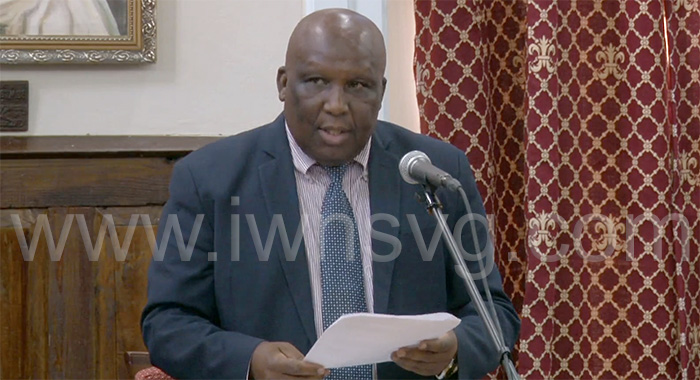Minister of Health St. Clair Prince says that the government could not continue the transportation arrangements that it put in place for nurses during the COVID-19 pandemic.
“… it was a specific period for a specific reason. … And we had funding for that,” he said in Parliament, on Monday, in response to a question from opposition senator, Shevern John.
“We didn’t continue it in that way. We couldn’t, as a matter of fact, because you have to transport nurses from all about. But this time, we’re going to use transportation, as I said, from within the Ministry of Health, who would go Windward, Leeward, depending on the shifts, and transport people to the hospital,” Prince said.
He was responding to a supplementary question from the opposition lawmaker, who had initially said that nurses working on evening duties, nights and public holidays experience difficulties catching transport on time and are sometimes left for long hours on the road to get to work or to their homes.
John asked the health minister to say what measures are in place to ease this transportation problem for these front-line workers.
Prince said his ministry has been having some discussions with the Nurses Association and also the senior nursing administration on the issue.
“And that’s because we value highly our nursing staff and the outstanding contribution and dedication to meeting the nation’s health care needs,” he told lawmakers.
Prince said meeting and improving the needs of nurses, including that for transportation services, remains a priority for the Ministry of Health.
He said the government’s support through the provision of transportation allowance and on-call allowance to nurses in the community nursing service is a clear indication of a commitment to meeting and enhancing the transportation needs of health care workers here.
The minister further said that the government’s precedent is set where the state provides transportation to healthcare workers during any disruption of the public transportation service, such as strikes.
“And this is demonstrated during the early days of COVID-19 pandemic, the explosive eruptions of La Soufriere and the withholding of services by the private providers of public transportation.”
He said that where there are communities where formal transportation services might either not be available or are insufficient, his ministry has filled the healthcare transportation challenge in many ways.
“… and chief among them are arranging for the provision of transportation services free of cost for nurses in need on weekend duties, nights and public holidays.”
He said the ministry will soon begin using its vehicles and drivers to provide transportation services, particularly on public holidays and on weekends.
“Of course, we will transition to doing nights also,” the health minister said, adding that the ministry will try to provide special duties to nurses who have to work late evening shifts.
“We try also to use persons who live closer to the hospital to do these shifts.”
Prince said the government has signaled its intention to people in the private sector who want to deal with this particular niche of transporting people, on weekends and on public holidays and in the night.
“For instance, other workers, like the hospitality people, people in bars and hotels, etc., would need that particular transportation also, and the nurses themselves will get that particular benefit,” he told Parliament.
“So, these are the ways in which we are trying immediately to deal with the shortage of transportation for nurses. And we hope that we can continue to improve on it,” Prince said.







If the public had a modern decent public transport system, Gov. would not have to be in white space wondering how to get essential and outside of 9 to 4 workers ( who, one can argue keep the country going) a decent, affordable and timely daily transport.
After all, special arrangements are pretty expensive and a good proportation of people experience public transport woes outside of the 8 to 4 competitive and somewhat combative private sector services presently.